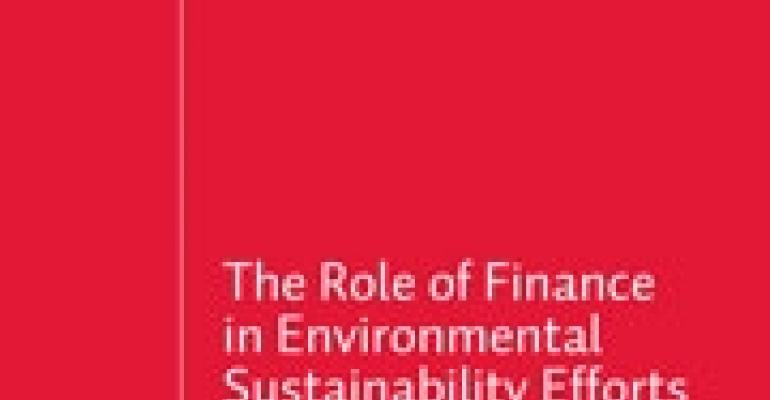
Senior finance executives believe companies that reduce their impact on the environment can achieve significant financial benefits ranging from reduced operating costs to improved shareholder value and better employee retention. That’s according to a recent study, “The Role of Finance in Environmental Sustainability Efforts,” published by commercial real estate company Jones Lang LaSalle and CFO Research, a unit of CFO Publishing Corp.
“Most CFOs believe sustainability can lead to cost savings, increased revenues, greater customer retention and a competitive advantage, so clearly this is an opportunity that can not be ignored,” says Lauralee Martin, global chief operating and financial officer at Jones Lang LaSalle. “The question each of us should ask is whether we are taking an aggressive enough position, given the rapidly approaching tipping point of this issue.”
In collaboration with Jones Lang LaSalle, CFO Research surveyed 175 corporate CFOs and senior finance executives to produce the report, which is available by request from Jones Lang LaSalle. Although most finance executives acknowledged that their own role in driving sustainability was limited, the survey results point to what Martin describes as a tremendous opportunity for CFOs to guide their companies to sustainable strategies that bring financial success.
Among the reports key findings:
* More than half of finance executives believe their companies are very likely or somewhat likely to enjoy financial benefits through sustainability. The most often-cited result is reduced risk, deemed very or somewhat likely to benefit 78% of companies surveyed. Next are enhanced brand and reputation (77%), customer retention (72%), and improved employee health and productivity (68%).
* Regulatory compliance is the highest priority for corporate sustainability, according to 61% of survey responders, and is a mid-level need for 26% of those surveyed. Improving energy efficiency and reducing greenhouse gas emissions is a high priority for 47%, mid-level for 32%; and reducing the environmental impact of operations is the top concern for 45% and a mid-level objective for 32% of respondents.
* The greatest barriers to incorporating sustainability into financial strategy include the inability to measure the effects of green practices on shareholder value, (ranked among the top three challenges by 46% of respondents), inability to document sustainability effects on financial performance (37%), and a lack of standard decision-making frameworks that consider environmental factors (36%). The least significant challenge is organization resistance, ranked among the top three barriers by just 20% of respondents.
In addition to the survey, researchers conducted in-depth interviews with executives at several firms leading the way in sustainability, including Bank of America and Herman Miller. The report’s authors focused on heavy hitters, too: Only 2% of those surveyed had company revenues less than $100 million, and the largest group (41% of respondents) reported annual revenues between $1 billion and $5 billion. Some 30% of those surveyed were from companies with revenues beyond $5 billion.
Sustainability is a key component of Jones Lang LaSalle’s service platform. In 2007, the firm helped corporations reduce energy usage by 210 million kilowatt-hours, saving $38 million in energy costs and reducing greenhouse gas emissions by 133,000 metric tons. The firm provides more than 11,000 properties with specialized energy services, manages 27 buildings that received Energy Star certification in 2008, and has 40 Leadership in Energy and Environmental Design (LEED) registered projects under way totaling more than 25 million sq. ft.
“At Jones Lang LaSalle, we are pursuing ways to make our own operations more sustainable,” says Dan Probst, chairman of the global environmental sustainability board at Jones Lang LaSalle. “But our biggest opportunity to make an impact is to help our clients — the owners and users of real estate — in making their buildings more sustainable, lowering their energy costs and reducing their carbon footprint.”
For a copy of “The Role of Finance in Environmental Sustainability Efforts,” email Craig Bloomfield, vice president of public relations at Jones Lang LaSalle, at [email protected].

